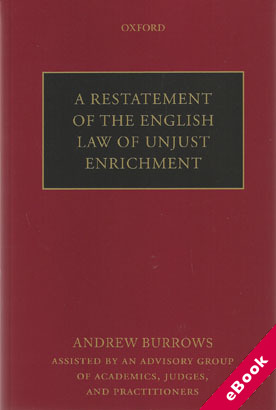
The device(s) you use to access the eBook content must be authorized with an Adobe ID before you download the product otherwise it will fail to register correctly.
For further information see https://www.wildy.com/ebook-formats
Once the order is confirmed an automated e-mail will be sent to you to allow you to download the eBook.
All eBooks are supplied firm sale and cannot be returned. If you believe there is a fault with your eBook then contact us on ebooks@wildy.com and we will help in resolving the issue. This does not affect your statutory rights.
A Restatement of the English Law of Unjust Enrichment represents a wholly novel idea within English law. Designed to enhance understanding of the common law the Restatement comprises a set of clear succinct rules, fully explained by a supporting commentary, that sets out the law in England and Wales on unjust enrichment.
Written by one of the leading authorities in the area, in collaboration with a group of senior judges, academics, and legal practitioners, the Restatement offers a powerfully persuasive statement of the law in this newly recognized and uncertain branch of English law. Many lawyers and students find unjust enrichment a particularly difficult area to master. Combining archaic terminology with an historic failure to provide a clear conceptual structure, the law remained obscure until its recent rapid development in the hands of pioneering judges and academics.
The Restatement builds on the clarifications that have emerged in the case law and academic literature to present the best interpretation of the current state of the law. The Restatement will be accessible to, and of great practical benefit to, students, academics, judges, and lawyers alike as they work with this area of law. The text of the Restatement is supported by full commentary explaining its provisions and roots together with its application to real and hypothetical cases.
The Restatement appears as European private law takes its first steps towards harmonization. In providing an accessible survey of the English law, the Restatement will offer an important reference point for the English position on unjust enrichment in the harmonization debates.